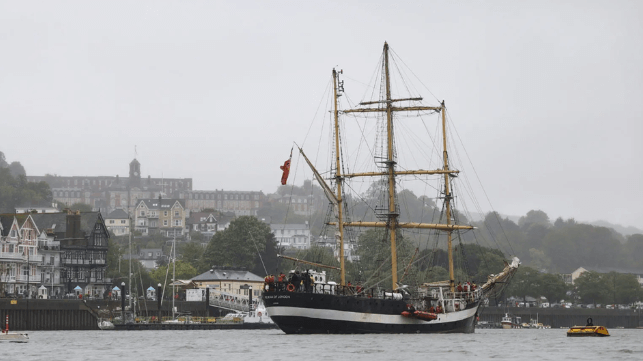Royal Navy Returns to Sail Training for Young Officers

The Royal Navy is looking to train officers under sail for the first time in decades by chartering a tall ship.
Experts believe the unique experience of crewing a traditional sailing vessel around the British Isles will teach vital navigational skills and nurture a strong bond of teamwork and community spirit integral to life in the Royal Navy.
Several trials have taken place this year on the British-flagged square rigged Sail Training Ship Pelican of London, with sailors experiencing sailing in the Irish Sea and Bristol Channel and visiting Liverpool, Dublin, Belfast.
The feedback has been overwhelmingly positive, said Lieutenant Commander David Carter, the Royal Navy’s liaison officer with the Merchant Navy, who is now hoping to charter a similar vessel for nine months in 2026, giving hundreds of trainee officers and sailors the unique experience.
The initiative would mostly benefit would-be warfare officers waiting to begin their demanding courses. With space limited on Royal Navy warships, some of the key elements of practical, real-world instruction could be delivered on a sailing vessel.
Lt Cdr Carter said Pelican of London was a “fabulous ship for instilling Royal Navy ethos and concentrating on training value”, hosting up to 32 trainees and four instructors at a time. “It’s also a morale lifter, a truly fabulous experience for many starting at sea.”
While the tall ship may lack the technology and sensors of a modern warship, the fundamentals of seafaring are identical, and the experience of crewing such a ship has fostered a strong sense of teamwork and boosted morale.
The latest batch of junior officers – both Royal Navy and Royal Fleet Auxiliary – helped bring Pelican of London into Dartmouth this week after battering through a Force 8 gale in the Channel.
The tall ship’s Master Captain Roy Love said life aboard his vessel – a former trawler built just after World War 2, converted into a sail training vessel for young people – was rudimentary, but the experience was hugely beneficial.
“The modern Navy is very technical – we are not,” he explained. “There are few electronics. We are here to teach the basics of seamanship, what’s it like to live and work at sea, how to work together. It’s a steep learning curve for most, but the skills benefit anyone who sails with us.”
Sub Lieutenant Isaac Robinson struggled with seasickness on the voyage from Dublin, but when on duty found it an exhilarating experience.
“This is an experience of real life at sea – a great starting block, learning the basics of life at sea, getting into the rhythm. It’s harking back to what our ancestors did and the origins of the Navy,” said the junior officer from Ramsgate in Kent.
Aboard on the same rough crossing was Royal Fleet Auxiliary Cadet Adam Dennis. Although he’s undergone six months of intensive training in college, he had not spent any time at sea until joining the Pelican.
“It’s been an experience – certainly rougher than we expected, but once we’ve dried off I think we will look back and say we enjoyed it. I certainly jumped in at the deep end, picked things up on board quickly. I would absolutely recommend it,” he said.
Sub Lieutenant Joel Crownshaw said crewing a vessel like the Pelican had provided an excellent introduction to important training – as well as broader experience of life at sea in the Navy.
“The ship offers a good introduction - she makes approximately six knots, allowing a calm environment in which to consider situations and make measured decisions, building up confidence before you move on to larger and faster vessels,” Joel explained.
“In addition, the mix of officers and ratings provided a career first introduction to personnel support and considerations – the two are generally kept quite separate up to this point. All of us found that experience incredibly beneficial in setting us up for future responsibilities.”
There was also praise for the merchant crew who passed on their skills and experience to the young Royal Navy officers, like Sub Lieutenant Hilton Forsyth who sailed to Portsmouth, Dartmouth, Dublin and the wildlife haven of Lundy in the Bristol Channel and find his several weeks at sea and found them packed with “worthwhile experiences”.
“The most notable benefit for warfare young officers was a navigation teaching/testing/discussion session with an experienced crew member,” Hilton added. “His teaching style is memorable and was of great benefit.”
This article appears courtesy of Royal Navy News and may be found in its original form here.
The opinions expressed herein are the author's and not necessarily those of The Maritime Executive.

